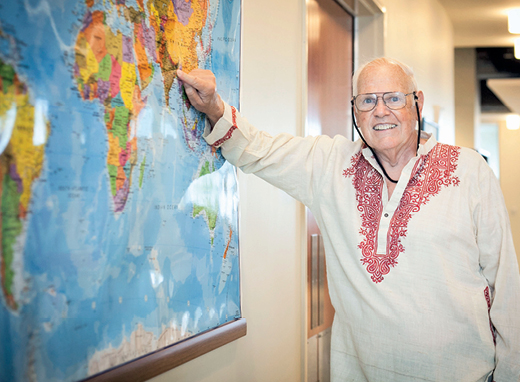Stanley Foster has worn his share of colorful shirts and comfortable sneakers during his 50-plus years in global health.
They are familiar trademarks to the legions of Rollins School of Public Health students whom he has taught for nearly 20 years.
Those who take his courses on global health and community building often come away transformed. In his classes, Foster encourages students to think about where they are going and the challenges ahead. One of his students lost five family members during the 1994 genocide in his native Rwanda. Foster's class helped the young man right himself and prepare for the new life chapter before him.
"The thing I've enjoyed most is counseling students," said Foster last fall upon receiving the school's 2012 Distinguished Achievement Award—one of several honors he has received for public health practice and teaching. "The students here are fantastic. I tell them, 'If you want to make a difference in the world, come to Rollins.'"
Foster too has made a difference. As a young Epidemic Intelligence Service officer at the CDC, he examined thousands of schoolchildren in Arizona for trachoma and investigated other health emergencies, including plague, measles, shigella, kerato conjunctivitis, and rotavirus on behalf of the Indian Health Service. In 1966, Foster was invited to join the CDC's new Smallpox Eradication Program and spent eight years partnering with national health workers in Nigeria, Bangladesh, and Somalia. His efforts helped make history in 1980 by officially eradicating smallpox from the world.
For the next 14 years, Foster worked to improve the health and survival of children in more than a dozen African countries with the International Health Program Office at the CDC. Through his work with the Combating Childhood Communicable Disease Project, he focused on prevention; case management of priority illnesses such as malaria, pneumonia, and diarrhea; and strengthening preventive and curative systems.
In 1994, after serving more than 30 years at the CDC, Foster began his second career at Rollins, where he has taught and mentored students in the classroom and community health workers around the world. Each summer, Foster and his wife, Dottie, travel to the highlands of Guatemala to lead an empowerment workshop for women.
"Everyone wants to have a career like Stan Foster," noted his friend and colleague, former CDC director William Foege, during a Rollins Alumni Awards ceremony in which he was bestowed the Distinguished Achievement Award. "His family is the world."

